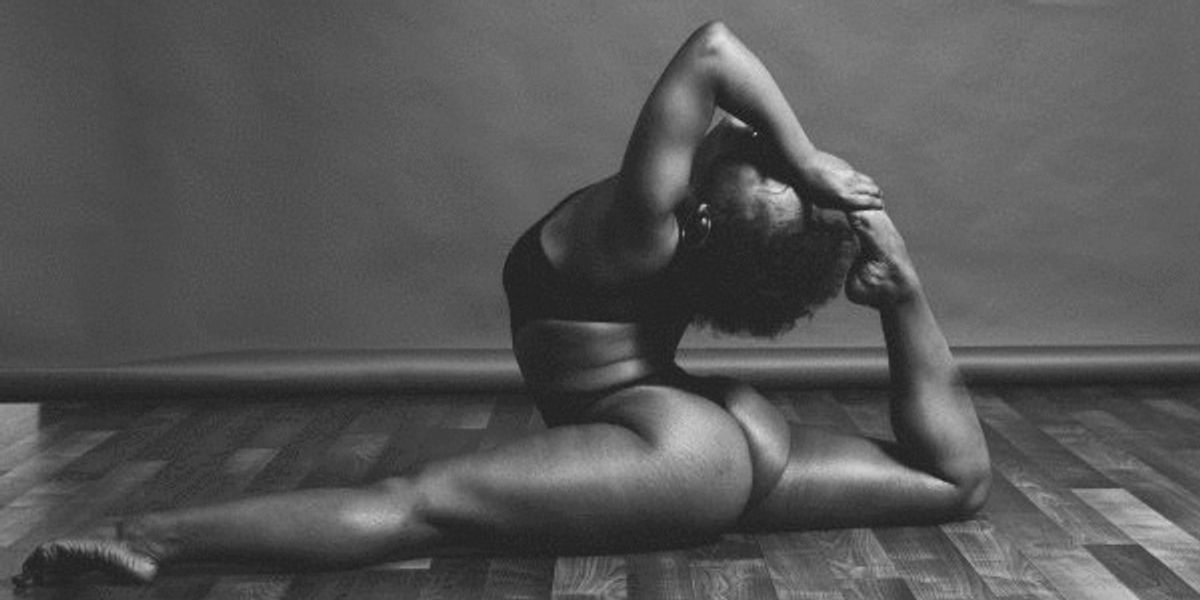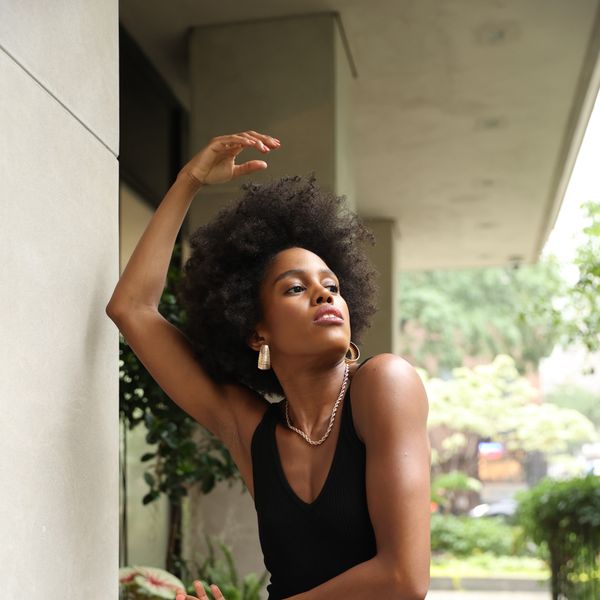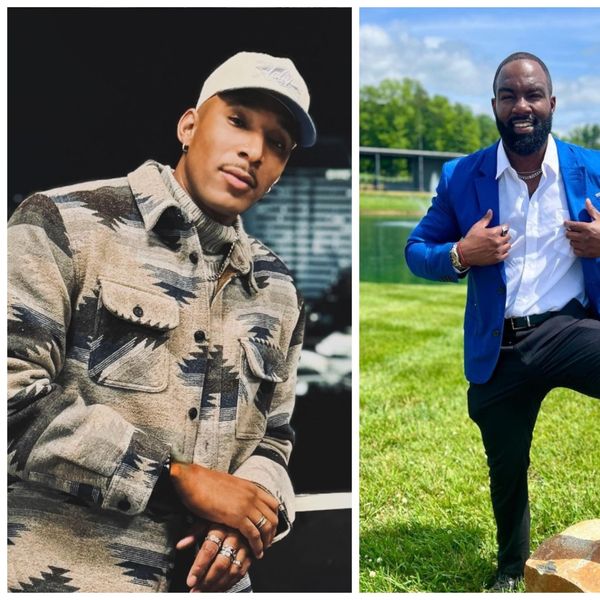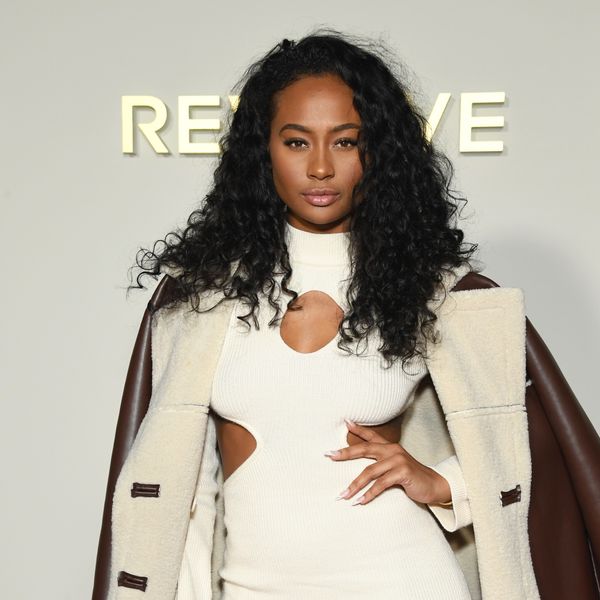
The Empowering Way This Rape Survivor Took Back Her Life
It can be extremely difficult to rebound after a traumatic experience, and Tyde-Courtney Edwards knows more than a thing or two about that struggle. Tyde-Courtney's life changed drastically when, in 2012, she was sexually assaulted near her Baltimore, Maryland apartment.
She was beaten, robbed, spit, and urinated on during the horrific crime---one she detailed for Shape readers last year---and the incident couldn't have happened at a worst time. When the rape happened, Tyde-Courtney, a professional dancer, was prepping for a big audition, a new beginning in a new apartment, and the completion of studies to earn a degree in pedagogy. The incident derailed her plans, crippled her confidence, and ushered her into a life eclipsed in fear and shame. To add to the trauma, Tyde-Courtney found out she was pregnant and went through an abortion alone.
"A lot of things that we don't learn as trauma victims, following any type of physical attack is how to go about reclaiming the vibe again," she told xoNecole in an exclusive interview. "When you are with hospitals or when you have done all your pre-approved sessions with your counselor, you're kind of just left in this odd limbo. And nobody gives you any information about where you could go after that."
"It's very much like a treat 'em and street 'em situation. 'Well, we did what we were supposed to do. You came to your 12 sessions. I gave you all of your pills.'"
Tyde-Courtney, whose attacker was never brought to justice, found herself in a place of depression and self-destruction not knowing how exactly to move forward. "It was just…there wasn't anywhere for me to go and I was devastated. I was fucking myself up. I was just creating these situations where I would allow myself to fall into trouble or to get into more pain and to be as self-destructive as I could," she recalls.
"I just got tired of feeling sorry. I just got tired of being scared. I was tired of whining to people about how I was feeling or whining to people about not being able to convey your feelings, because that's another thing that we deal with. When we have been traumatized, there's all of these feelings, all of these emotions we have that we cannot vocalize."
Tyde-Courtney made a life-changing, brave choice to take her healing into her own hands and turn to what had brought her joy for so many years. She also decided to be the change she wanted to see, to fill a void that she felt other black women could also be struggling with but could find no recourse. From her trauma and her healing, Ballet After Dark was born.

"The program was going, mainly out of necessity. I was struggling trying to find somewhere for me to heal various aspects of myself. And there wasn't a space---a safe space---for women of color to be able to work through their trauma without us feeling marginalized or judged or looked down on in any type of way," she said. "And a lot of these spaces that have been created--- these recreational spaces---are for a particular type of individual. When I would try to be a part of things so that I could heal, or even when I would do the research just so I could be a part of things---just so I could get my shit together---nothing was welcoming of me. There was not a program that allowed for me to deal with, not only the issues that come with domestic and sexual trauma, but also the issues that come with being a black woman…and just being an oversexualized black woman---just trying to be a woman who wants something for herself."
Based in Baltimore, Ballet After Dark offers concierge, ballet-based fitness services, athletic conditioning programs, dance classes, and self-care workshops to survivors of sexual and domestic assault. In carrying out its mission, Tyde-Courtney seeks to be a resource of healing for women who have gone through what she went through, strengthening mind, body, and spirit.
"[Instead of] paying a counselor to talk about all of my issues, all of disappointments, all of my aspirations, everything that I wanted to get accomplished, and there was no place to create my sister circle following the trauma. Going through my trauma and trying to figure out ways to reconnect with myself, led me back into dance."
Even while building the program, she knew she had to let her voice be heard to get past the shame of the experience. Shifting focus to her physical and mental health and to service through dance was a saving grace for Tyde-Courtney. "[I thought], 'Why am I supposed to be quiet about anything? Why am I supposed to be ashamed of anything? Why can't I be confident?' I work for my shit. I'm still working through my shit. I'm still getting through my shit. Why can I not be proud of the fact that I have come from A to D? I'm not at Z. I may not ever get to Z, but I'm here now, so why can I not stand on a mountain and shout that shit out? Why can I not be proud of the fact that after being assaulted and following that with an abortion, that I'm actually able to have healthy sex?"
"There is no room for you to be a survivor of sexual assault and to be bi-positive or to be sex positive…or just to be positive in general."
"You should be living under a fucking rock, so I'm just over that... I've really had the chance of just letting people have it. I'm also sending out a bunch of 'fuck you's' because I'm tired. You know. And I'm in this fight; I'm in this fight for the rest of my life, but I'm not going to deal with no bullshit."
Also, facing aspects of her sexual freedom and health as a woman was important--and she keeps it super-real about that in a way that is self-aware and empowering.
"I've always had a very, very comfortable relationship with sex, even before everything happened. I've always been comfortable talking about it, I've always been comfortable laughing about it. I was always that girl that had 100 boyfriends, just because we were always be sitting around talking about sex… I don't want to be stifled by anything. I have allowed myself to grow into this woman who is 100% transparent. I'm not hiding anything."
Accomplishing full renewal of self after trauma is a journey, and there's no sprint to the finish line for many women working toward it. Tyde-Courtney is very aware that it takes perspective, patience, and perseverance to take things one day at a time. She also recognizes that not every sexual assault survivor's journey to normalcy would feel, sound, or look the same. She began to readily accept and embrace positive truths about herself and what she offered the world.
"I'm a hard worker. I'm a lover. I am a nurturer by nature. I am the mother of a movement right now. But beside all of that, I am a strong, black woman; that's who I am. That's exactly who I am. If nobody knew anything about me and they didn't know my name and they didn't know my story; if they didn't know my education level, they didn't know my level of talent and technique, what they would be able to take away from me is the fact that I exude strength," she said.
"As a survivor, I will have my moments of depression. I will have my moments of just blank voids, when everyone needs to leave me the fuck alone, but I'm not going to deny myself of certain feelings. And I'm not going to tell myself that I should be a certain way. I'm also going to be enough of a sound mind to know that in order for me to have the things that I want, in order for me to have a healthy relationship, in order for me to get to a point where I'm considering a family, I had to work on myself. And I still have to. I had to understand that I may be working on myself for the rest of my life. I had to be okay with that."
"Healing is not linear; there's no perfect way for it to be done."
Tyde-Courtney continues to push forward with Ballet After Dark and is working on a documentary and a workshop tour to expand her advocacy of self-care, fitness, self-confidence, and empowerment to survivors across the country.
"I think the best thing I've discovered about myself is how strong [and] how resilient I actually am. Nothing can break me! It really can't. I think that is what's most pleasing to me, that at the end of the day, with everything that I'm doing and with everything I'm trying to accomplish, I'm ready to keep doing it. I just want to change some lives. That's all I want to do. And they better take advantage of me now, because I might want a baby in a couple of years! They better use me up!"
*Interview has been edited and condensed for clarity
Follow Tyde-Courtney Edwards and her journey with Ballet After Dark on Instagram.
- Ballet After Dark: A Story of Resilience After Sexual Trauma | BLAVITY ›
- Ballet After Dark (@balletafterdark) • Instagram photos and videos ›
- Dancer Who Had an Abortion After Being Brutally Raped Shares ... ›
- Ballet After Dark uses dance, meditation to heal emotional scars ... ›
- Tyde-Courtney Edwards | الملف الشخصي ›
- We're Healing at Ballet After Dark ›
- See How This Ballerina Rape Survivor Is Helping Other Victims ... ›
- Ballet Helped Me Reconnect With My Body After Being Raped, Now ... ›
- Tyde-Courtney Edwards | Facebook ›
This article is sponsored by Hulu.
UnPrisonedhas returned for its highly anticipated second season, delving deeper into the complex dynamics of the Alexander family.
The series premiere comes a year after its debut season garnered rave reviews from fans and critics and earned record-breaking ratings for Hulu's Onyx Collective brand. UnPrisoned's success can be attributed to its raw, relatable themes and comedic appeal.
Inspired by creator Tracy McMillan's life, the show follows Paige (Kerry Washington), a therapist and single mother whose life takes an unexpected turn when her father, Edwin (Delroy Lindo) --who was released from prison-- moves in with her and her teenage son, Finn (Faly Rakotohavana).
Throughout UnPrisoned's first season, viewers witnessed how Edwin's incarceration deeply affected Paige's life and relationships. In the series, Paige unpacks her trauma through interactions with her inner child and her online followers. Meanwhile, Edwin is overcoming specific struggles with his own past that led to his life of crime, including a dysfunctional upbringing and his mother's arrest. As the Alexanders attempt to reconcile, new challenges arise.
This new season promises to further explore their unconventional family dynamic. Here are several compelling reasons why season two of UnPrisoned should be on everyone's watchlist.
The Alexander Family Life Is Still In Shambles
UnPrisoned's second season resumes where the series left off, with Paige grappling with the fallout from her troubled therapy practice and Edwin navigating life independently after moving out. Meanwhile, Finn faces his own challenges. The teenager is battling anxiety and seeking information about his father—a topic Paige avoids discussing.
The Alexander Family Are Attending Therapy To Resolve Their Underlying Issues
Amid the chaos in their lives, the Alexander family decides to mend their bond by confronting their past traumas. They seek professional help and attend therapy sessions with a “family radical healing coach,” played by John Stamos, a new cast member. This collective effort aims to unravel the complexities of their shared history and strengthen their relationships.
The process of unraveling each character's internal conflicts and their potential impact on future relationships may clash with Paige's textbook therapy approach. While Paige is used to being in the therapist's seat in both career and family, this forces her into the unfamiliar role of a patient during therapy sessions. This shift would compel her to look in the mirror and try a radically different approach.
The Alexander Family Learned A Big Lesson During A Therapy Session
In therapy, the Alexanders are tasked with addressing their individual traumas to salvage their remaining relationships. One of the family therapist’s eccentric suggestions was an exercise involving a family wrestling match. During this session, Paige faces tough questions about her refusal to share information about Finn's father.
While it's unclear whether this scene is reality or fantasy, the image of the family duking it out in the ring certainly makes for hilarious yet compelling television.
Paige Tries Dating Again Following Failed Relationships
Amid her life's chaos, Paige decides to step back into the dating field. However, her many attempts have left her with mixed results. The dating apps have turned out to be a fail, and an outing with her ex Mal (Marque Richardson), who is also her father's parole officer, doesn’t go quite as expected after he brings an unexpected guest – his new girlfriend.
The situation takes an awkward turn when Mal's new partner learns why the former couple split, partly due to Paige's self-sabotage.
UnPrisoned Is A Perfect Balance Of Comedy And Drama
As a dramedy, UnPrisoned takes a comedic approach to its heavy subjects. The show takes us on a ride with Paige's dating misadventures and navigating a friendship with her ex.
Other lighthearted moments include Edwin's attempts at CPR based on online videos and, of course, the antics of the Alexander family's unconventional new healing coach.
The second season of UnPrisoned is now available on Hulu.
UnPrisoned | Season 2 Trailer | Hulu
Feature image courtesy
Mariee Revere On Her History-Making Million-Dollar Sales And The Future Of MoonXCosmetics
If the name Mariee Revere sounds familiar, it's probably because you heard of her beauty and skincare brand, MoonXCosmetics, or you may have heard about her history-making achievement of making $1.8 million in less than eight minutes. But before starting her million-dollar brand, Mariee was just a teenager trying to cure her acne.
While she grew up in the skincare capital of the world, South Korea, Mariee didn't really experience breakouts until her senior year of high school. Like many people who get their first breakout, she didn't know what to do, and there weren't many products out there at that time. So she decided to experiment. What she didn't know was that what she came up with would ultimately be her ticket to success.
"When I graduated high school, I moved back to America, Georgia, and I ended up making, like, the oil, the Rose Galore oil, which is like the staple product of my brand. I don't know what made me make it, but I did, and it literally cleared my face up," she tells xoNecole in an exclusive interview.
"I end up selling it as a body oil first because, obviously, I'm 17, [and] don't have any background as an esthetician or anything like that. I just made a product that worked for me, but people bought it and was using it, and I reformulated it, and then it just stuck like with me."
While MoonXCosmetics is known for its facial products, it wants to expand to body care and home. It just released its new product, Moon-Gel body wash, and it's only up from there. As Mariee continues to grow the brand, it's more than likely that she will see more history-making moments. And so far she has.

Photo courtesy
When asked if she feels pressure to obtain more of those milestones, she says yes and no. "I did $1.8 [million] again, and then I did $2 million but I feel like now, currently, I don't look at that as one of my goals anymore because [of] the headache and just everything that came with it, but I was thankful and blessed to have that milestone, but now I'm looking for more," she says.
"I want to say more reach than more like fast-paced sales. I do want that. Obviously, every girl wants that, but I do want to have a better overall reach for my brand because I did take two years off so I was able to learn, [and] study a lot of different things. See how things have changed from 2020 to now."
"I did $1.8 [million] again, and then I did $2 million but I feel like now, currently, I don't look at that as one of my goals anymore because [of] the headache and just everything that came with it, but I was thankful and blessed to have that milestone, but now I'm looking for more."
Another part of expanding for any company is hiring people. Finding the right person to help you can be a hassle, especially for business owners who are used to doing all the work themselves. Mariee can relate to this, and she touched on this topic in her documentaryThe Million Dollar Story. She recommends having someone be your "right-hand man" who you trust to handle the ins and outs of the company.
"I could say, definitely get, like a right-hand man to help you within the process because that really was what helped me. I never had a job. I literally was 18 now, being like, you know, the boss of over 30+ employees at one point in time, and I didn't know anything. I didn't know anything about no W-2s, no taxes, no clock in, clock out because all I [have] ever known was my brand," she explains.
"So I definitely partner with people who are very skewed and versed in those areas, and they helped me get through it. Even to this day, I still have my same person helping me with hiring, firing, [and] doing everything that I can right now because I'm still learning. But obviously people get jobs young, so they have way more experience than me, but still learning."
And though she is still learning, one thing she makes sure to stay on top of is being consistent. Consistency is what trips many people up when it comes to achieving goals, but Mariee says it's all about scheduling. Whether it's when to post on social media or email marketing, scheduling it out can make a world of difference. That same practice also works when planning out her future goals for the company.
"Right now, future goals would be to drop at least five more products before the end of the year. We always do outreach, where we do drives and all that, but definitely do way more this year, she says. "Then really dive into body [care], and then hopefully open up MoonXBody underneath MoonXCosmetics to let that branch out and be open and definitely get back consistent."
For more information, visit moonxco.com.
Let’s make things inbox official! Sign up for the xoNecole newsletter for love, wellness, career, and exclusive content delivered straight to your inbox.
Feature image courtesy













